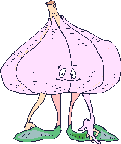Garlic in India
The ancient Indians had varying views on garlic; but, for the most part, it was considered to be highly beneficial to the body. Ancient Sanskrit writings, dating as far back as 5,000 years ago, described the healing properties of garlic. In fact, the ancient medical practice of Ayurveda, which is still practised today, promoted garlic as one of the most important herbs. It recommends garlic in over 100 formulations for treating stomach, liver, tumor, asthma and other similar problems.The Charaka Samhita is the oldest surviving Ayurvedic text, dating back to 200 BCE to 200 CE (AD), and suggests using garlic for alleviating:
- worms
- piles
- leukoderma
- leprosy
- epilepsy
- heart disease
- fainting
- arthritis
- rheumatism
- chronic rhinitis
- baldness.
Other Ayurvedic teachings recommend garlic for:
- arteriosclerosis
- pain
- cholera
- dysentery
- indigestion
- constipation
- appetite loss
- fatigue
- typhoid
- tuberculosis
- cough
- fractures.
On the other hand, the ancient Indians believed garlic was a natural aphrodisiac that inspired lust and stimulated passions and, as a result, holy men, monks, widows, adolescents, and fasting persons were forbidden from consuming garlic. In addition, it was considered to be rajasic food; which meant it had unsettling effects on the body and devotees on the path to spiritual enlightenment were advised against eating it. The Buddists, Jains, Greeks and Romans also shared these sentiments; however, some believe the mild irritation garlic caused in the genitourinary tract may have resulted in its aphrodisiac and rajasic status.


No comments:
Post a Comment